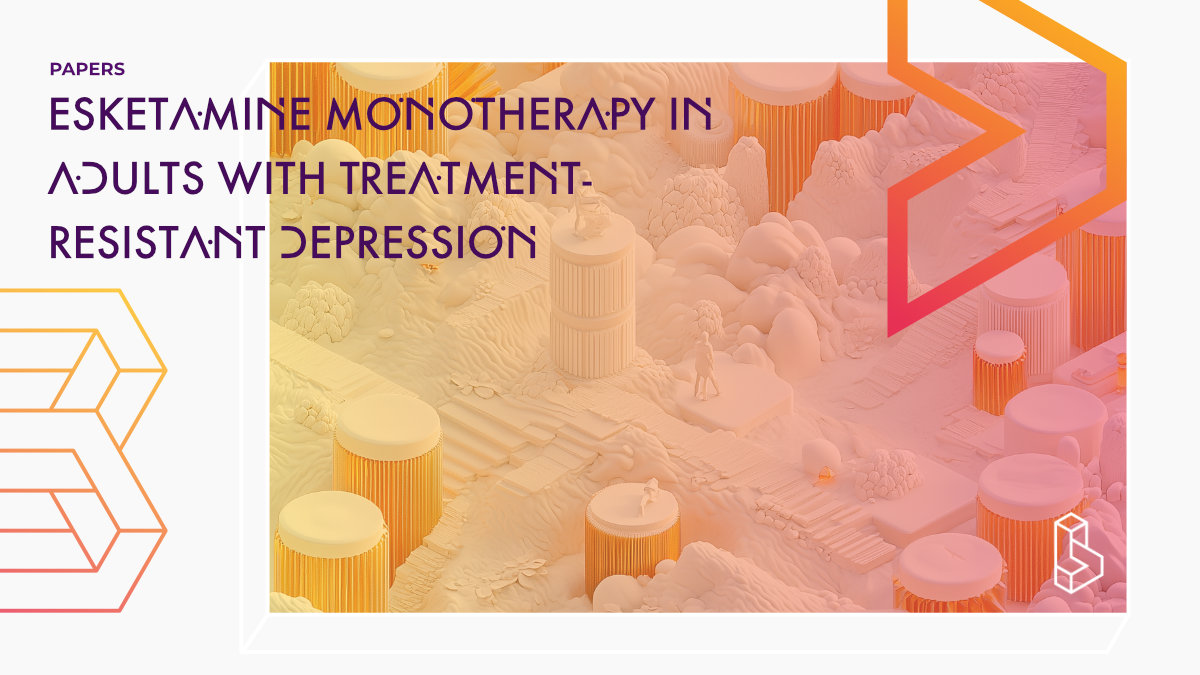This Phase IV randomized controlled trial (n=378) found that esketamine nasal spray (Spravato) monotherapy at both 56mg and 84mg doses significantly reduced depression scores compared to placebo in treatment-resistant depression (TRD) patients at 28 days, with rapid onset of effect observed within 24 hours and moderate effect sizes of 0.48 and 0.63 respectively.
Abstract of Esketamine Monotherapy in Adults With Treatment-Resistant Depression
“Importance: Esketamine nasal spray, administered in conjunction with an oral antidepressant, is approved for treatment-resistant depression (TRD). However, the efficacy of esketamine nasal spray administered as monotherapy for patients with TRD has not yet been evaluated.
Objective: To assess the efficacy and safety of esketamine monotherapy compared to placebo in reducing depressive symptoms in patients with TRD.
Design, Setting, and Participants: This phase 4, double-blind, placebo-controlled randomized clinical trial was conducted from November 2020 to January 2024 at 51 outpatient centers in the US. Adults with major depressive disorder (DSM-5 criteria) without psychotic features who experienced inadequate response (≤25% improvement) to 2 or more oral antidepressants during the current depressive episode were eligible for inclusion. Data analyses were conducted from March 1, 2024, to July 8, 2024.
Interventions: After a 2-week or longer antidepressant-free period, participants were randomized at a 1:1:2 ratio to fixed-dose intranasal esketamine (56 mg or 84 mg) or matching intranasal placebo, administered twice weekly for 4 weeks.
Main Outcomes and Measures: Change in Montgomery-Åsberg Depression Rating Scale (MADRS) score from baseline to day 28 (primary efficacy end point) and to 24 hours post–first dose (day 2; key secondary efficacy end point) were analyzed by a mixed-effects model using repeated measures.
Results: In this multicenter randomized clinical trial, 378 participants who met prerandomization MADRS severity criteria received 1 or more study drug doses (esketamine, 56 mg [n = 86]; esketamine, 84 mg [n = 95]; or placebo [n = 197]). Mean (SD) participant age was 45.4 (14.1) years, 231 participants (61.1%) were female, and baseline mean (range) MADRS total score was 37.3 (28-50). At day 28, the least-square (LS) mean difference (SE) between esketamine and placebo was −5.1 (1.42) (95% CI, −7.91 to −2.33) for the 56-mg dose and −6.8 (1.38) (95% CI, −9.48 to −4.07) for the 84-mg dose (for each, 2-sided P < .001). Observed effect sizes were 0.48 and 0.63 for the 56-mg and 84-mg dose groups, respectively. At day 2 (approximately 24 hours post–first dose), the between-group difference was significant for both esketamine doses: −3.8 (1.29) (95% CI, −6.29 to −1.22; 2-sided P = .004) for 56 mg and −3.4 (1.24) (95% CI, −5.89 to −1.00; 2-sided P = .006) for 84 mg. The most common treatment-emergent adverse events reported for esketamine (combined doses) were nausea (56 participants [24.8%]), dissociation (55 [24.3%]), dizziness (49 [21.7%]), and headache (43 [19.0%]).
Conclusions and Relevance: According to results of this multicenter, double-blind randomized clinical trial, esketamine monotherapy may expand treatment options for adult patients with TRD by addressing an unmet need of patients experiencing treatment-limiting tolerability concerns and nonresponse with oral antidepressants.“
Authors: Adam Janik, Xin Qiu, Rosanne Lane, Vanina Popova, Wayne C. Drevets, Carla M. Canuso, Matthew Macaluso, Gregory W. Mattingly, Richard C. Shelton, John M. Zajecka & Dong-Jing Fu
Summary of Esketamine Monotherapy in Adults With Treatment-Resistant Depression
Major depressive disorder (MDD) remains a leading cause of disability worldwide, with a substantial proportion of patients—around 35%—failing to respond to at least two adequate trials of oral antidepressants (OADs). This condition is known as treatment-resistant depression (TRD). TRD is associated with greater morbidity, including higher rates of suicide attempts and mortality, and the longer it goes untreated, the harder it becomes to manage effectively. Although several pharmacological strategies exist, such as augmentation with other drugs or switching antidepressants, these approaches often bring tolerability issues like weight gain, sexual dysfunction, and sedation, contributing to poor adherence and discontinuation.
Esketamine, a nasal spray formulation and a non-competitive N-methyl-D-aspartate (NMDA) receptor antagonist, has shown promise in treating TRD when used alongside OADs. However, esketamine as a stand-alone (monotherapy) treatment had not previously been evaluated in a large-scale randomised controlled trial. Janik and colleagues designed this study to determine whether esketamine alone could effectively reduce depressive symptoms in adults with TRD and to evaluate its safety profile, thereby addressing an important unmet need for patients intolerant to or unresponsive to conventional oral antidepressants.
Methods
Study Population
Eligible participants were adults diagnosed with MDD, either recurrent or persistent for at least two years, without psychotic features. Importantly, participants had to demonstrate TRD, defined as showing 25% or less improvement to at least two different OADs in their current depressive episode. Participants needed a baseline score of 34 or higher on the 30-item Inventory of Depressive Symptomatology–Clinician Rated (IDS-C30), indicating severe depression. Individuals with certain psychiatric disorders, such as psychosis, bipolar disorder, recent substance use disorder, or prior exposure to ketamine or esketamine, were excluded.
Study Design
Find this paper
Esketamine Monotherapy in Adults With Treatment-Resistant Depression: A Randomized Clinical Trial
https://doi.org/10.1001/jamapsychiatry.2025.1317
Open Access | Google Scholar | Backup | 🕊
Cite this paper (APA)
Janik, A., Qiu, X., Lane, R., Popova, V., Drevets, W. C., Canuso, C. M., ... & Fu, D. J. (2025). Esketamine Monotherapy in Adults With Treatment-Resistant Depression: A Randomized Clinical Trial. JAMA Psychiatry.
Study details
Compounds studied
Ketamine
Placebo
Topics studied
Treatment-Resistant Depression
Depression
Study characteristics
Placebo-Controlled
Double-Blind
Randomized
Participants
378
Humans
Compound Details
The psychedelics given at which dose and how many times
Ketamine 56 - 84mg | 1x
Linked Clinical Trial
A Study of Esketamine Nasal Spray, Administered as Monotherapy, in Adult Participants With Treatment-resistant DepressionThis Phase IV double-blind, multicentre, placebo-controlled trial (n=477) aimed to assess the efficacy, safety, and tolerability of esketamine nasal spray (Spravato) as monotherapy in adult participants with treatment-resistant depression (TRD).

